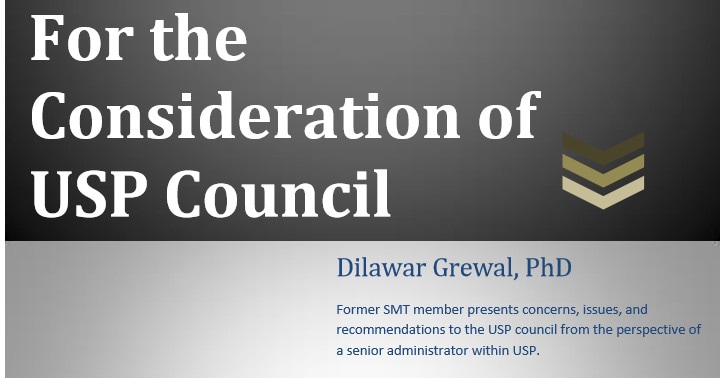GOT a story for us? Email us at [email protected]
"There is a fair bit of corruption associated with the Staff Review Process. It has been brought to the attention of the VCP by the VPA that sometimes what the SRC decides is mis-recorded by the HR people or deliberately changed, then what is sent to Payroll does not match what the SRC recommended, and then what gets put onto the Banner system is still different. There have been instances where people rewarded by SRC did not receive their proper rewards or people undeserving of rewards as determined by the SRC have been handsomely rewarded."
"The VCP enjoys the freedom of issuing statements on any topic, including topics where he clearly may not be an expert, yet the staff is controlled from freely expressing their points of view or even being friends with people with diverse views. The point to note is that the students we are cultivating at the University today will be the leaders of tomorrow. If their development was within the confines of restricted and censored thoughts and expressions, then you will see the effects later on. Discourse, diversity and expansion of thought should be the benchmark of their education at USP, not absolute control by administration."
 Dilwar lifts the lid on USP
Dilwar lifts the lid on USP Are Universities present to regurgitate old ideas in classes and make students conform to those ideas? Are Universities present only to make faculty and administrators feel secure? Are Universities afraid of someone else, especially young brains, coming up with new ideas and new ways of thinking? Should everyone be so afraid of the powers of the VCP that all discourse on any topic can only be in accordance with his viewpoint, lest one be fired for diversity of thought?
There is a difference between dissension and diversity of thought. Banning political discussions, actively discouraging discussion on academic or administrative topics through fear mongering, and not organizing or allowing others to organize activities such as open debates and open forums where different ideas can be shared is a disservice to the very essence of a University. Nobody is suggesting that the university become a hotbed of activism, as that is not the primary role of universities, however, promoting diversity of thought and exploring and developing of new ideas is the primary role of universities.
The VCP enjoys the freedom of issuing statements on any topic, including topics where he clearly may not be an expert, yet the staff is controlled from freely expressing their points of view or even being friends with people with diverse views. The point to note is that the students we are cultivating at the University today will be the leaders of tomorrow. If their development was within the confines of restricted and censored thoughts and expressions, then you will see the effects later on. Discourse, diversity and expansion of thought should be the benchmark of their education at USP, not absolute control by administration.
Academic Freedom Recommendations:
Promote open forums, debates and activities where people feel free to share all sides of issues in legal, peaceful and constructive ways.
Take remedial actions to remove the perceived and perpetuated power of the VCP in controlling free discourse and diversity of thought at the University. Staff and students should not be afraid of sharing different points of view and getting shut up or fired by the VCP or administration.
Empower the Faculty, staff, Professors, students, HOSs and Deans to promote diversity of thought. They can be responsible for the consequences of their voices – it is not the job of the VCP to be the thought police, even if it is to protect the staff or students from the consequences of free speech, freedom of thought and expression – in other words allow Academic Freedom.
Staff Review Process:
The staff review process at USP has serious issues and is a source of immense discontent amongst the staff and directly affects the morale of the staff. The main issues with the staff review process are:
Nobody really knows what they are being evaluated on year to year. The criteria keeps on changing
The system itself is very subjective. People have to request to be reviewed and this usually happens when they are seeking promotions, bonuses or increments. Non-performers don’t bother asking for reviews and get away with non-performance
iPerform, the performance management system, is tangential and barely relevant to most of the University staff. The questions are hardly relevant for most positions.
Supervisors don’t have to do anything to monitor anybody’s performance and provide them with feedback on improvement, yet can demolish any chances of rewards for an employee by literally a one sentence review. Further, it has been observed that supervisors with a poor command of the English language actually hurt the chances of their reportees getting appropriate rewards because the Staff Review Committees look for certain words they think appropriately articulate exemplary staff performance worthy of rewards
There is a fair bit of corruption associated with the Staff Review Process. It has been brought to the attention of the VCP by the VPA that sometimes what the SRC decides is misrecorded by the HR people or deliberately changed, then what is sent to Payroll does not match what the SRC recommended, and then what gets put onto the Banner system is still different. There have been instances where people rewarded by SRC did not receive their proper rewards or people undeserving of rewards as determined by the SRC have been handsomely rewarded.
A proposal was made to the VCP to seal all SRC minutes, HR recordings of SRC meetings, SRC reports to Payroll, Payroll entries into Banner, and the letters on record sent to Employees in order to identify sources of corruption. However, one obstacle after another was presented to keep the VPA from achieving the desired result of sealing all records.
Another issue with the staff review process is that since no remediation plans are presented and evaluated as part of this process, favoritism plays a huge part. Certain people perceived to have power at USP influence the reward system quite dramatically in comparison to an average supervisor. The idea that who you know matters more than what you do is quite prevalent in context of the staff review process. This is not good for staff morale or staff performance. At USP, what benefits staff most? What you know and do? or Who you know?
Staff Review Process Recommendations:
Modify iPerform or replace it with something that is relevant to the various tiers of employee categories at USP. Make it predictable in the sense that employees know a year in advance what is expected of them
Standardize workload requirements so that people know what they are expected to do
Put the burden of performance on both the employee and the supervisor. Currently the supervisor has no burden, hence can shift all responsibility to the employee. This leads to corrupt practices.
Make performance assessment mandatory and not just for people who request it.
Create a staff review committee system that has independent reviews. For example take out the SMT members from particular committees that review their areas. This will curtail undue influence, reduce favoritism and generate independence and objectivity. Further, tier the system so that high administrators cannot exert undue influence on the system.
Have record keeping where corrupt practices can be easily identified and action taken.
Supplemental pay
Supplemental pay at USP is an unmitigated joke.
It is a powerful tool at the disposal of the VCP. Policy requires that in order to grant inducement to anyone, a market analysis must be performed and recommendations made to the VCP who then decides on whether or not to offer inducement, and if offering, then at what level. This is not how it works at USP. You would be hard pressed to find any independent real market study done to determine inducement. In current practice the key criteria is perceived to be how happy the VCP is with you. If he is not happy with you, inducement may disappear or get reduced in your next contract renewal.
On the other hand if you are in favor, you may find yourself being handsomely induced. There is no rhyme or reason that can be replicated to determine consistently who gets inducement and who doesn’t. In the least, this leads to discriminatory practices. Another aspect of this system is fundamentally flawed. If someone has been getting inducement year after year then perhaps it is more prudent to scale that position to that level. If not, then why provide inducement for decades? What standards are being followed and how transparent are they?
Giving supplemental pay is wrapped in secrecy at just about all levels of USP, including the top. Who gets supplemental pay, at what percentage, for how long, is hardly ever decided as per any established transparent processes that are visible to the general staff population. There is at least one example at USP where the VCP has approved substantive, i.e. six figure, supplemental pay to a staff member for multiple acting positions at the same time in various areas. In the least this is questionable practice. How can one person be able to take care of 3-4 different positions concurrently in various departments?
Again, there is no process that is followed to determine who is best suited for any acting position and how much should they be paid. This generates a culture of thinking that if you keep the VCP or certain other people happy, you will be rewarded very handsomely. Even if it doesn’t generate favoritism, it definitely generates the perception of favoritism and sometimes perception is much more powerful than actual practice. If you don’t think perception matters, then consider this: How many times has VP PF&RC been appointed Acting VCP in the past six months in comparison to the two DVCs and what message does this send? All three are peers, but do people perceive the VP PF&RC to have the same power as either of the two DVCs?
This is an example that does not involve money, just perceptions. In case of supplemental pays, it is not only perception that is affected, but also morale and stability.
There is also the practice of putting people into acting positions for years. Acting positions are supposed to be limited interim engagements to tide things over for the purpose of continuity. Acting positions can sometimes be misused to either just reward some people with extra money or to burden others with a substantive extra work for very little supplemental pay. Again, there is no standard process that is followed. Management and administration of departments suffer when acting positions are used in this manner.
Supplemental Pay Recommendations:
Strengthen HR policies around supplemental pay, inducements and acting positions.
There is no issue in giving Executive Privilege to the VCP around acting positions, however, he should then also be held responsible for fairness of practice. If the VCP is to decide who gets an acting HoS position, then it actually makes the Dean quite ineffective as an administrator.
All supplemental pay positions should be internally advertised and made transparent. Anybody with relevant qualifications/experience should be allowed to apply for these positions.
The percentage of supplemental pay should be established and enforced by policy, not arbitrary decisions by administration.
Conflict of interest should be more closely monitored when appointing people in supplemental pay situations.
To be continued


